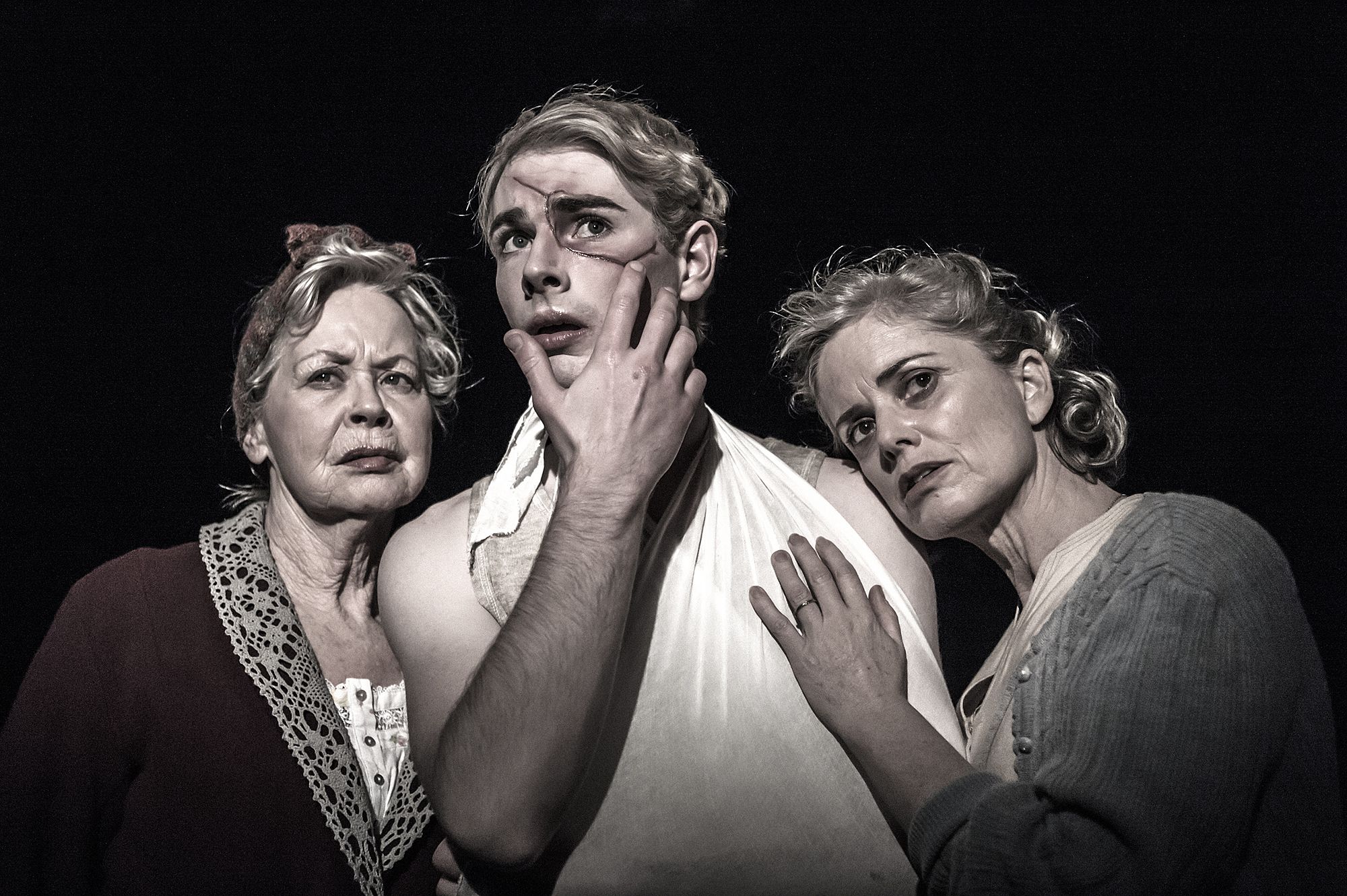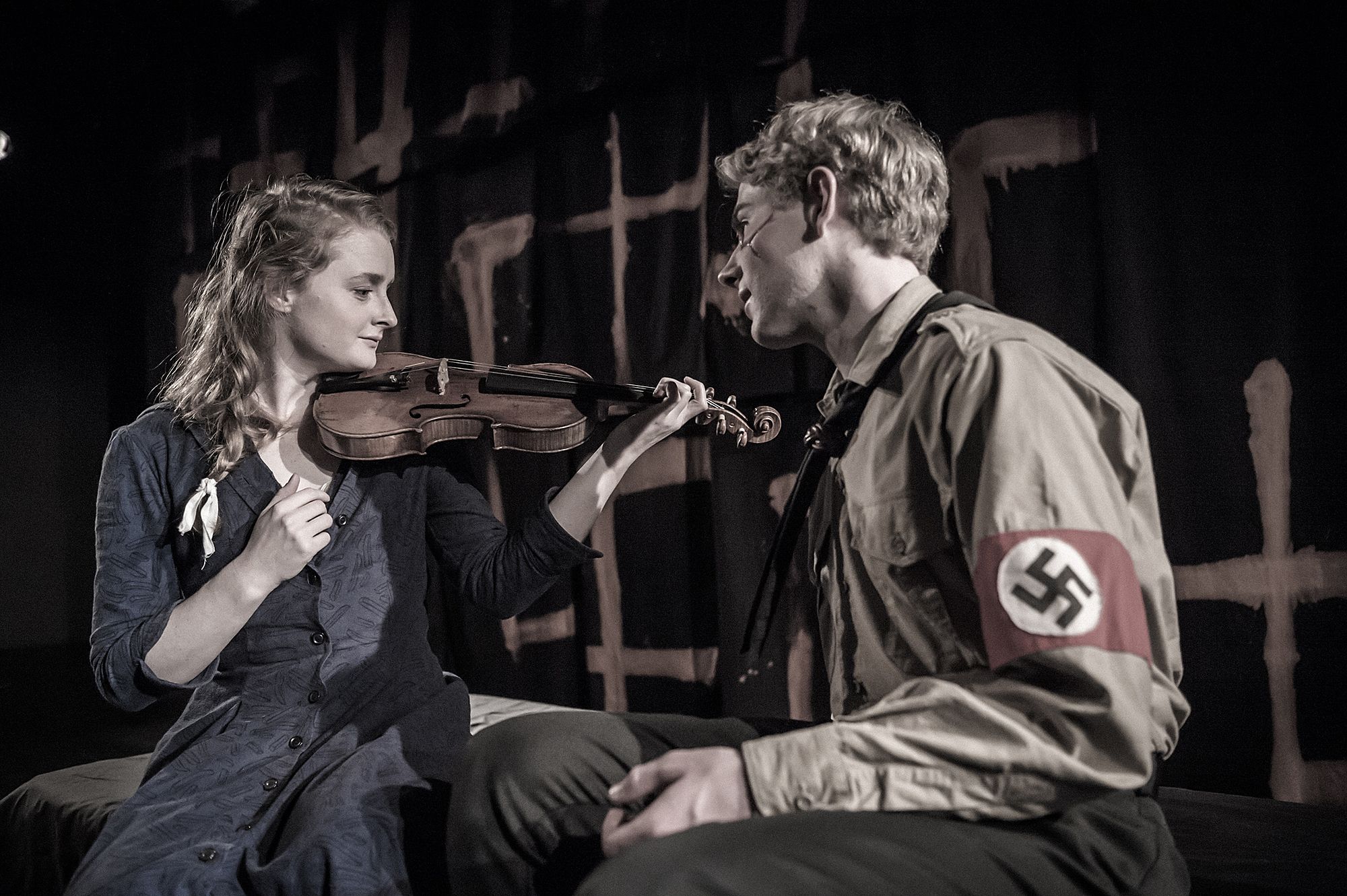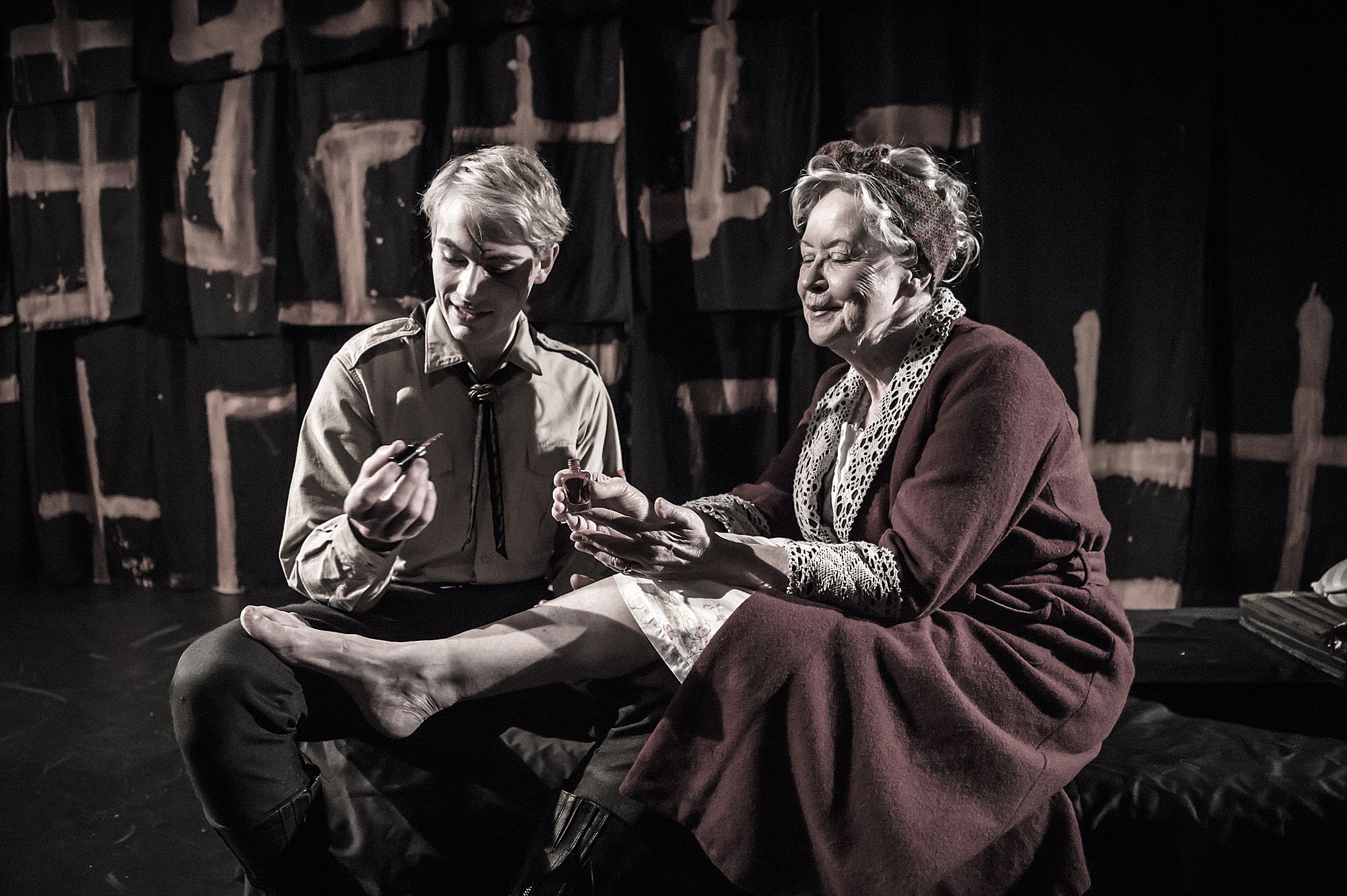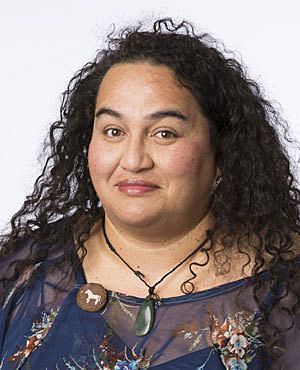Back To War: A Review of Caging Skies
Maraea Rakuraku reviews Caging Skies, an anemic and stubbornly old-fashioned drama about a Hitler Youth who discovers his family is hiding a young Jewish woman.
Maraea Rakuraku reviews Caging Skies, an anemic and stubbornly old-fashioned drama about a Hitler Youth who discovers his family is hiding a young Jewish woman.
In the opening scenes of Caging Skies by Desiree Gezentsvey, lighting and sound battle it out for superiority. It doesn’t let up for the duration of this 130-minute production.
Those very short initial scenes make for a jarring introduction to Johannes (Tim Earl), a bedridden Hitler Youth who displays his frustration by yelling at his frantic mother Roswita (Claire Waldron, who on first impression comes across as a nurse) and his Oma (Donna Akersten). He’s been involved in something that’s scarred his face and killed his friend, and he hears voices: is it the medication or is he communing with their giant portrait of Adolph Hitler? Then, da daaa, after confronting his mother about the voices (she denies their existence), Johannes discovers a passport in a violin case under his bed... belonging to his sister’s Jewish friend Elsa (Comfrey Sanders). Dun dun duuuun.
He doesn’t do what you’d expect a loyal Hitler Youth would do; no, he returns it to its hiding place. By the time this happens, though, about 30 minutes in, I’m still unsure where this story is even set. I eventually hear something about Vienna and stop floundering across Europe, but by then I’ve had to work really hard, in spite of the performance and dialogue, to try and figure that out. I’m not transported to Second World War Austria. At All. I’m acutely aware that this is a play, in a theatre, on a blustery Wellington afternoon. That I still have to work to ignore this a third of the way through takes the shine off, and the flat New Zealand accents aren’t helping.
We are constantly being told and told that it’s bad, what’s going on (no kidding). Johannes is obsessed with knives because we’re told that he’s obsessed. We know that Elsa is a violin player because that’s right, we’re told; just in case you missed it, there’s the loud screeching of a violin. All. The. Way. Through. While I don’t mind the soundscape designed by Jeremy Cullen, that is in some parts exquisite, it’s the way it’s used. Here’s some tension. Feel this. Are you scared? Feel this. It’s heavy handed and starts to feel manipulative.
And we know that it’s awful what’s happened to Wilhelm, Roswita’s missing husband, and Kippi, Johannes' friend, because (just in case you don’t get it) we’re told, that it’s awful. Roswita and Oma talk about the deaths of their loved ones casually; Waldron shows some emotional depth, but even her performance can’t shoulder the cliches and lack of mystery in this script.
Frankly, I’m told things so often, and feel so little from those telling, that it’s difficult to engage with the work emotionally. Johannes’ knife obsession is based on the possession of a single item – I better watch out, I have an obsession with watches – that he weakly waves about when he discovers Elsa hiding in his house. (That he even bothers while wearing a swastika?)
Later, when Elsa reunites with her violin, she may as well be touching a plank of wood for all the emotional heft it carries. That she then leaves it behind, well, in historical and contemporary images and footage of refugees walking across country, sailing across seas, carrying what meagre possessions they have as who knows what it can be traded for. So, to abandon the sole item that connects you materially to your past and is the difference between food or starvation?
The zero chemistry between the lead actors unfortunately is reflected in the zero empathy I feel for character and it has me asking what, exactly, is being told here, and why? Why this telling of this story? What relevance does this work hold now?
Moments after Johannes threatens Elsa with his one knife, he’s copping a feel from the target of said knife threat. I stifle my guffaw only to hear someone else in the audience slip. In this section of Caging Skies, Elsa is always kneeling at Johannes’ feet, insinuating that she’s willing to do “just about anything” to survive; there’s some drive to present her as a femme fatale, a seductive jewess, in this imbalanced relationship but it is so weak and awkward; there is nothing in its playing that makes it even vaguely believable, such is the vacillation of tone and the outlay of the narrative. That’s because rather than centred upon Elsa, this story is very much, about Johannes. Johannes is onstage for most of the action and this is his telling.
I don’t have a problem with that on principle. I do have a problem with it when we’re asked to make moralistic judgments about a vulnerable woman whose life is dependent upon someone indoctrinated to hate her. Paranoid, politically-active Roswita even nonsensically forgets that Elsa’s in the house - we know that because Elsa wails to Johannes, ad nauseum, “Where’s your Mother? I’m so hungry! Has she forgotten me?” That we’re then asked to believe that Elsa switches allegiance to Johannes, so easily? Well, there’s just not enough depth in the playing of the characters or the narrative to even make that vaguely believable. The zero chemistry between the lead actors unfortunately is reflected in the zero empathy I feel for character and it has me asking what, exactly, is being told here, and why? Why this telling of this story? What relevance does this work hold now?
Given the current refugee situation, exacerbated by the conflict in Syria, and the growth in visibility of Neo-Nazis and fascist movements – this work should hold a lot of relevance. There’s a hint early on, when one of the characters casually says “the Fuhrer is a madman,” that there may be something new to this retelling. I’m reminded of current heads-of-states that could be described similarly and am excited as to how Caging Skies will play to that: not because that’s its purpose but because state-wielded oppression is no different whether it occurred 2000 years ago, 200 years ago or tomorrow, and neither are the responses.
It is incredibly disappointing then that, with so much promise, Caging Skies fails to deliver not only in the presenting of what it was like for Austrians living under a Nazi-occupied Vienna but in its telling of a story that speaks to us now, with tropes and with so little care to originality or craft. Kurt’s betrayal of Liesel – that’s right, I’m referencing The Sound of Music – is more potent.
Everything onstage has to earn its place. I’m racking my brain throughout about whether anything does and there is one thing, the big portrait of Hitler. This confronting and uncomfortable image of who has to be one of the most famous people to have lived – fitting given this age of social media stars-turned-tyrants. When Johannes turns the portrait around to reveal one of Elsa, the switching of one obsession for another, there’s real power in the moment. The kind of powerful moment that I really wish was spread evenly throughout the performance.
I expect, I want, hell I’m demanding more, but there is nothing new here. Nothing. Caging Skies wastes opportunities to inform, empower, engage and enlighten. As genocide rages in corners of this world, as people leave their homelands for lands that are often more hostile, as recent events like those in Charlottesville are burned into our screens, we deserve more than stereotypes. At least make your time and your voice matter.
Choices have been made here and unfortunately it all comes down to a story that isn’t that interesting (let me reiterate not because of its topic), and dialogue that is excruciating to listen to. At one stage, the person next to me, holds her hands to her face. I assume it’s because she’s riveted which makes me concentrate harder, that maybe I am missing something crucial. It’s not until later she tells me she was cringing.
Caging Skies runs from 12 August to 9 September at Circa Theatre.
Tickets available here.



